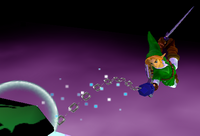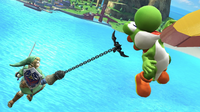Hookshot: Difference between revisions
Gligar2007 (talk | contribs) m (→Clawshot) |
|||
| Line 9: | Line 9: | ||
The '''Hookshot''' is [[Link]]'s [[grab]] in ''Super Smash Bros.'' and ''Super Smash Bros. Melee'', [[Young Link]]'s grab in ''Super Smash Bros. Melee'' and ''Super Smash Bros. Ultimate'', and [[Toon Link]]'s grab in ''Super Smash Bros. Brawl'', ''Super Smash Bros. 4'', and ''Super Smash Bros. Ultimate''. In ''Super Smash Bros.'', the hook of the Hookshot fires straight out, and then returns straight back. In ''[[Melee]]'' and ''[[Brawl]]'', however, the Hookshot/Clawshot (respectively) fires straight out, falls to the ground, and is then slung back towards Link. Also in ''Melee'', Link/Young Link use this to perform the [[wall-grapple]], since the Hookshot can latch to essentially any wall at any point at appropriate distances. Using the Hookshot on an incline causes it to retract immediately, which often leaves Link vulnerable for short periods of time. This is notable on [[Princess Peach's Castle]]. Using this technique, one can use [[mindgame]]s to assist in recoveries by choosing either to sweet spot the ledge or grapple another point of the wall; however, should the wall-grapple miss or otherwise fail, Link/Young Link will be left in the "[[helpless]]" animation. Additionally, the Hookshot may be used immediately after an [[air dodge]], meaning a directional air dodge can give additional distance before using the Hookshot. | The '''Hookshot''' is [[Link]]'s [[grab]] in ''Super Smash Bros.'' and ''Super Smash Bros. Melee'', [[Young Link]]'s grab in ''Super Smash Bros. Melee'' and ''Super Smash Bros. Ultimate'', and [[Toon Link]]'s grab in ''Super Smash Bros. Brawl'', ''Super Smash Bros. 4'', and ''Super Smash Bros. Ultimate''. In ''Super Smash Bros.'', the hook of the Hookshot fires straight out, and then returns straight back. In ''[[Melee]]'' and ''[[Brawl]]'', however, the Hookshot/Clawshot (respectively) fires straight out, falls to the ground, and is then slung back towards Link. Also in ''Melee'', Link/Young Link use this to perform the [[wall-grapple]], since the Hookshot can latch to essentially any wall at any point at appropriate distances. Using the Hookshot on an incline causes it to retract immediately, which often leaves Link vulnerable for short periods of time. This is notable on [[Princess Peach's Castle]]. Using this technique, one can use [[mindgame]]s to assist in recoveries by choosing either to sweet spot the ledge or grapple another point of the wall; however, should the wall-grapple miss or otherwise fail, Link/Young Link will be left in the "[[helpless]]" animation. Additionally, the Hookshot may be used immediately after an [[air dodge]], meaning a directional air dodge can give additional distance before using the Hookshot. | ||
In ''Super Smash Bros. Brawl'' and ''Super Smash Bros. 4'', Toon Link uses his to perform the [[tether recovery]] and grab. Similar to Link's Clawshot, if it misses, Toon Link is left wide open. It also has two hitboxes that follow the same mechanic from Link's Clawshot. In ''Brawl'', Toon Link's Hookshot has a shorter range in grabs and tethers compared to Link's Clawshot, but this makes it slightly faster. As it is the case with all tether recoveries in ''Brawl'', the Clawshot/Hookshot may only latch onto the [[ledge]], making [[edgehogging]] the recovery relatively easily. Link's and Young Link's Hookshots are based on their design in ''Ocarina of Time''. Toon Link's however, is based on its appearance in ''The Wind Waker''. | In ''Super Smash Bros. Brawl'' and ''Super Smash Bros. 4'', Toon Link uses his to perform the [[tether recovery]] and grab. Similar to Link's Clawshot, if it misses, Toon Link is left wide open. It also has two hitboxes that follow the same mechanic from Link's Clawshot. In ''Brawl'', Toon Link's Hookshot has a shorter range in grabs and tethers compared to Link's Clawshot, but this makes it slightly faster. As it is the case with all tether recoveries in ''Brawl'', the Clawshot/Hookshot may only latch onto the [[ledge]], making [[edgehogging]] the recovery relatively easily. Link's and Young Link's Hookshots are based on their design in ''Ocarina of Time'' (despite the latter not being able to use the Hookshot in that game). Toon Link's however, is based on its appearance in ''The Wind Waker''. | ||
{{clr}} | {{clr}} | ||
Revision as of 20:38, December 19, 2024
The Hookshot, or the Clawshot (which appears in Super Smash Bros. Brawl and Super Smash Bros. 4), is a grab aerial used by Link, Young Link, and Toon Link. The Hookshot is a recurring item in the Legend of Zelda universe, and the Clawshot has also featured in more than one Zelda game, albeit with a different appearance in each. All are tether recoveries and can grab a ledge in midair. In Super Smash Bros. Ultimate, Link no longer has his Hookshot nor his Clawshot due to neither appearing in the game Breath of the Wild, which his current design is based on. As a result, Snake's codec for Link on Shadow Moses Island was altered in a way (and the only one with this distinction) so that the mention of his Clawshot was removed because of this. However, Young Link and Toon Link both retain their respective Hookshot.
Hookshot
The Hookshot is Link's grab in Super Smash Bros. and Super Smash Bros. Melee, Young Link's grab in Super Smash Bros. Melee and Super Smash Bros. Ultimate, and Toon Link's grab in Super Smash Bros. Brawl, Super Smash Bros. 4, and Super Smash Bros. Ultimate. In Super Smash Bros., the hook of the Hookshot fires straight out, and then returns straight back. In Melee and Brawl, however, the Hookshot/Clawshot (respectively) fires straight out, falls to the ground, and is then slung back towards Link. Also in Melee, Link/Young Link use this to perform the wall-grapple, since the Hookshot can latch to essentially any wall at any point at appropriate distances. Using the Hookshot on an incline causes it to retract immediately, which often leaves Link vulnerable for short periods of time. This is notable on Princess Peach's Castle. Using this technique, one can use mindgames to assist in recoveries by choosing either to sweet spot the ledge or grapple another point of the wall; however, should the wall-grapple miss or otherwise fail, Link/Young Link will be left in the "helpless" animation. Additionally, the Hookshot may be used immediately after an air dodge, meaning a directional air dodge can give additional distance before using the Hookshot.
In Super Smash Bros. Brawl and Super Smash Bros. 4, Toon Link uses his to perform the tether recovery and grab. Similar to Link's Clawshot, if it misses, Toon Link is left wide open. It also has two hitboxes that follow the same mechanic from Link's Clawshot. In Brawl, Toon Link's Hookshot has a shorter range in grabs and tethers compared to Link's Clawshot, but this makes it slightly faster. As it is the case with all tether recoveries in Brawl, the Clawshot/Hookshot may only latch onto the ledge, making edgehogging the recovery relatively easily. Link's and Young Link's Hookshots are based on their design in Ocarina of Time (despite the latter not being able to use the Hookshot in that game). Toon Link's however, is based on its appearance in The Wind Waker.
Clawshot
The Clawshot is Link's grab in Super Smash Bros. Brawl and Super Smash Bros. 4. Although it is very similar to the Hookshot in Super Smash Bros. Melee, not only does it retract more quickly, but Link's new tether recovery now finds and tracks the wall, automatically sweetspotting a nearby ledge. Also, when used in the air to attack, there are two different hitboxes. The first is when the claw is shot out, and hits the opponent. The second hitbox is at the end of the Clawshot, when the claw closes. Also, if Link lands while using the Clawshot in the air, the move auto-cancels, which is a useful technique when combined with SHFF, quite possibly Link's best tactic for interrupting other characters' approaches. If used in contact with the ground, the move becomes a grab, and like all other tether grabs is laggy if missed. It should also be noted that if it fails, Link doesn't enter a Helpless state. In most cases, it's recommended to use the Clawshot for recovery because it helps prevent Link from getting edgeguarded by certain attacks.
The Clawshot has an invaluable edgehogging property in that it can quickly give Link more invincibility frames by pressing back after Link has grabbed the edge, and immediately pressing the grab button, releasing the Clawshot, and pressing the grab button again to instantly grab the ledge and gain invincibility frames. This technique is sometimes referred to as Zair Edgeguarding, even though it is used as an edgehogging technique.
Although the two function identically in Super Smash Bros, the Clawshot that Link uses in Twilight Princess is a fundamentally different weapon from the Hookshot in Ocarina of Time.
Sticker
| Name | Game | Effect | Character(s) |
|---|---|---|---|
| Hookshot | The Legend of Zelda: Ocarina of Time |
 Hookshot (Zelda Ocarina of Time) |
Gallery
Technical details
Link:
- Link (SSB)/Grab
- Link (SSBM)/Grab
- Link (SSBM)/Grab aerial
- Link (SSBB)/Grab
- Link (SSBB)/Grab aerial
- Link (SSB4)/Grab
- Link (SSB4)/Grab aerial
Young Link:
- Young Link (SSBM)/Grab
- Young Link (SSBM)/Grab aerial
- Young Link (SSBU)/Grab
- Young Link (SSBU)/Grab aerial
Toon Link:









